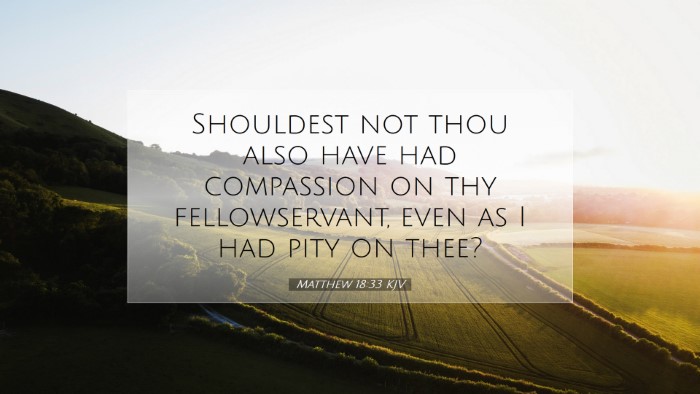Commentary on Matthew 18:33
Matthew 18:33 states, "Shouldn't you have had mercy on your fellow servant just as I had on you?" This verse follows the parable of the unforgiving servant, where Jesus illustrates the necessity of extending mercy to others as God has extended mercy to us. In analyzing this scripture, we can gain profound insights into the nature of forgiveness, accountability, and the depths of God's grace.
Contextual Background
This verse is located within a larger narrative where Jesus teaches His disciples about humility, reconciliation, and the ethical conduct expected of them as His followers. The parable encapsulates the theme of forgiveness and contrasts the overwhelming grace of God with the petty unforgiveness often exhibited by humanity.
Parable Overview
The parable tells the story of a king who forgives a servant an enormous debt, yet this same servant refuses to forgive a fellow servant a much smaller debt. The king learns of this and justly punishes the unforgiving servant, emphasizing the serious implications of failing to extend the mercy that one has received.
Insight from Public Domain Commentaries
Matthew Henry's Commentary
Matthew Henry notes that this verse illustrates the nature of God’s forgiveness towards humanity. He emphasizes that while our sins against God are infinitely larger than any offense against us, we are often nigh-sighted in our judgment of others. Henry exclaims that the ungrateful servant exemplifies the hypocrisy of those who receive grace yet are unwilling to extend it. He argues that this teaches us that we must not only receive mercy but also actively distribute it.
Albert Barnes' Notes on the Bible
In Barnes’ view, the fundamental moral principle in this verse is that of mutual obligation. He stresses that when we consider the immense debt that God has forgiven us—in contrast to the trivial offenses that others commit against us—it becomes clear that we are duty-bound to forgive. Barnes highlights that the heart of the Christian faith rests upon this notion of grace and forgiveness, reflecting the divine nature of God who shows compassion and mercy.
Adam Clarke's Commentary
Adam Clarke delves into the sociocultural implications of this verse. He points out the severe punishment the unforgiving servant faces and correlates it with the spiritual consequences that unforgiveness brings into one’s life. Clarke stresses that the Lord’s question serves as an indictment, urging believers to meditate on their own actions and attitudes towards forgiveness in light of God’s grace. He suggests that this parable serves as a wake-up call for the disciples and all future believers about the seriousness of harboring unforgiveness.
Theological Implications
This scripture opens a rich tapestry for theological reflection concerning the nature of God's grace and our response to it.
-
Divine Mercy:
The first implication is the understanding of God’s grace as foundational to the Christian faith. The king’s forgiveness represents God’s unmerited favor towards sinners. It calls us to recognize the vastness of our own need for forgiveness.
-
Role of Forgiveness in Discipleship:
This passage places a heavy emphasis on the necessity of forgiveness in the life of the believer. The act of forgiving others is not optional—it is a command that directly correlates with the mercy we have received.
-
Community Ethics:
In a broader community context, this verse exemplifies the need for a culture of forgiveness within the church. Unforgiveness can lead to discord, division, and ultimately, the detriment of the body of Christ.
-
Consequences of Unforgiveness:
The dire consequences faced by the unforgiving servant serve as a stark warning for all. Unforgiveness can hinder spiritual growth and damage one’s relationship with God and others.
Practical Applications
For pastors, students, and scholars alike, this verse prompts several applications:
-
Self-Reflection:
Encourage personal inventory regarding attitudes towards forgiveness. Reflect on any grudges or unfulfilled reconciliations.
-
Teaching Opportunities:
Use this parable in teachings about the importance of forgiveness. Stress it in pre-marital or marriage counseling, as forgiveness is vital for healthy relationships.
-
Congregational Practices:
Implement forgiveness as a core practice in congregational life through counseling and support groups that address issues of unresolved conflict.
-
Prayer and Meditation:
Encourage the practice of prayer that includes requests for the grace to forgive and for the strength to seek forgiveness from others.
Conclusion
In conclusion, Matthew 18:33 serves as a powerful reminder of the Christian mandate to mirror the mercy and forgiveness that we receive from God. The insights drawn from public domain commentaries enrich our understanding and urge us all—pastors, students, and scholars—to embody the spirit of forgiveness in our lives. As we strive to live out this call, we contribute to the transformative power of the Gospel, fostering a community of grace.


